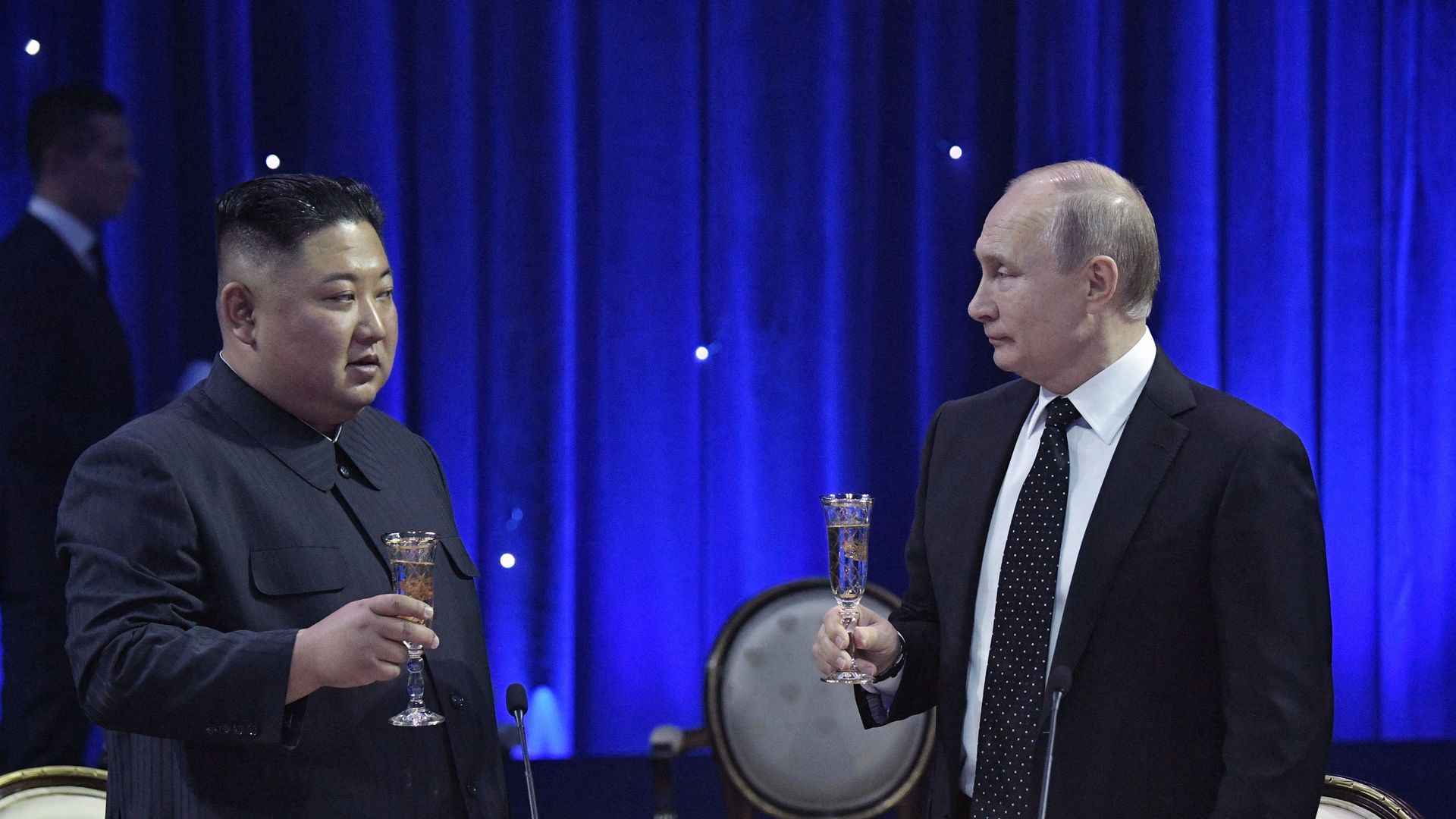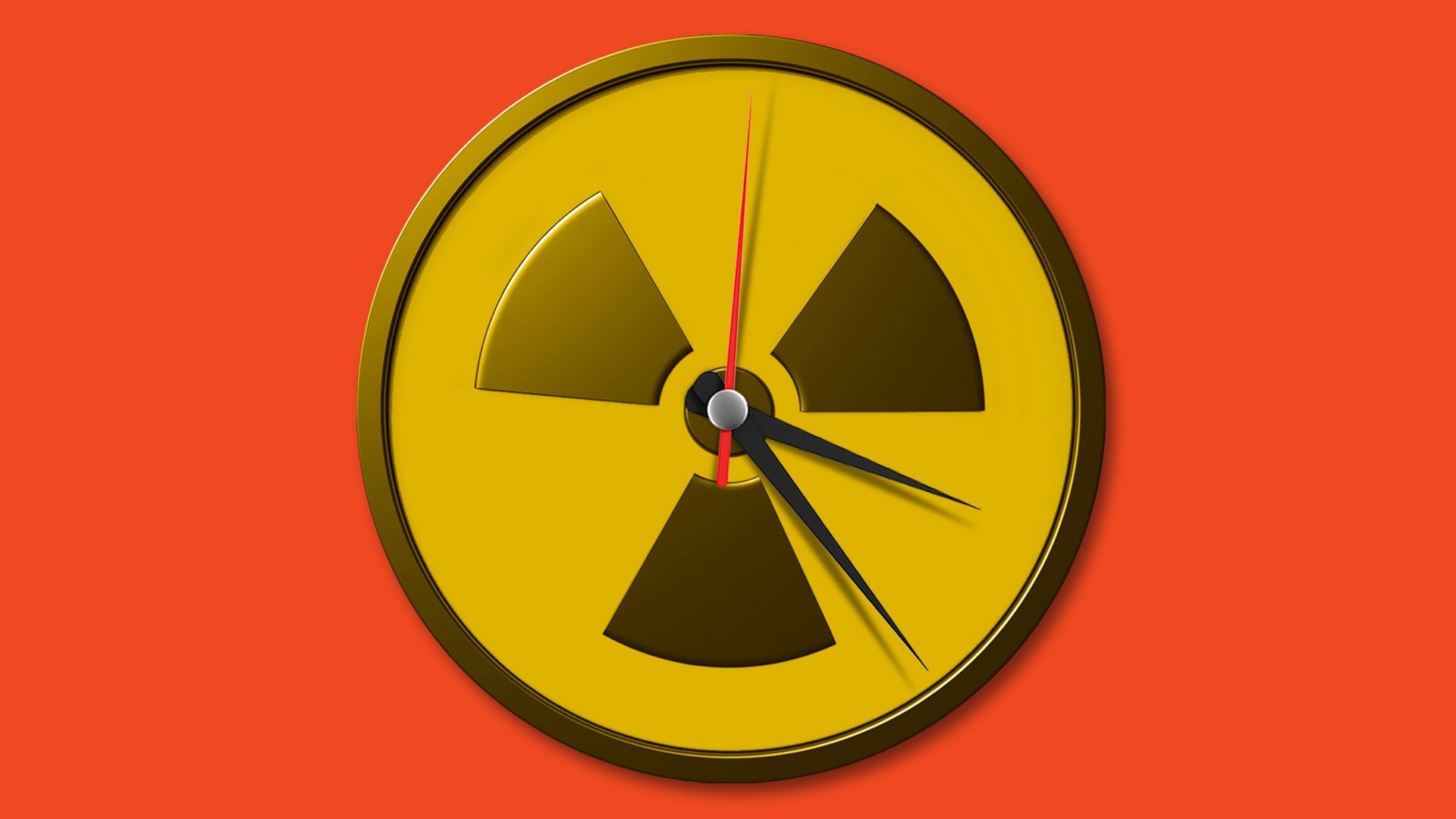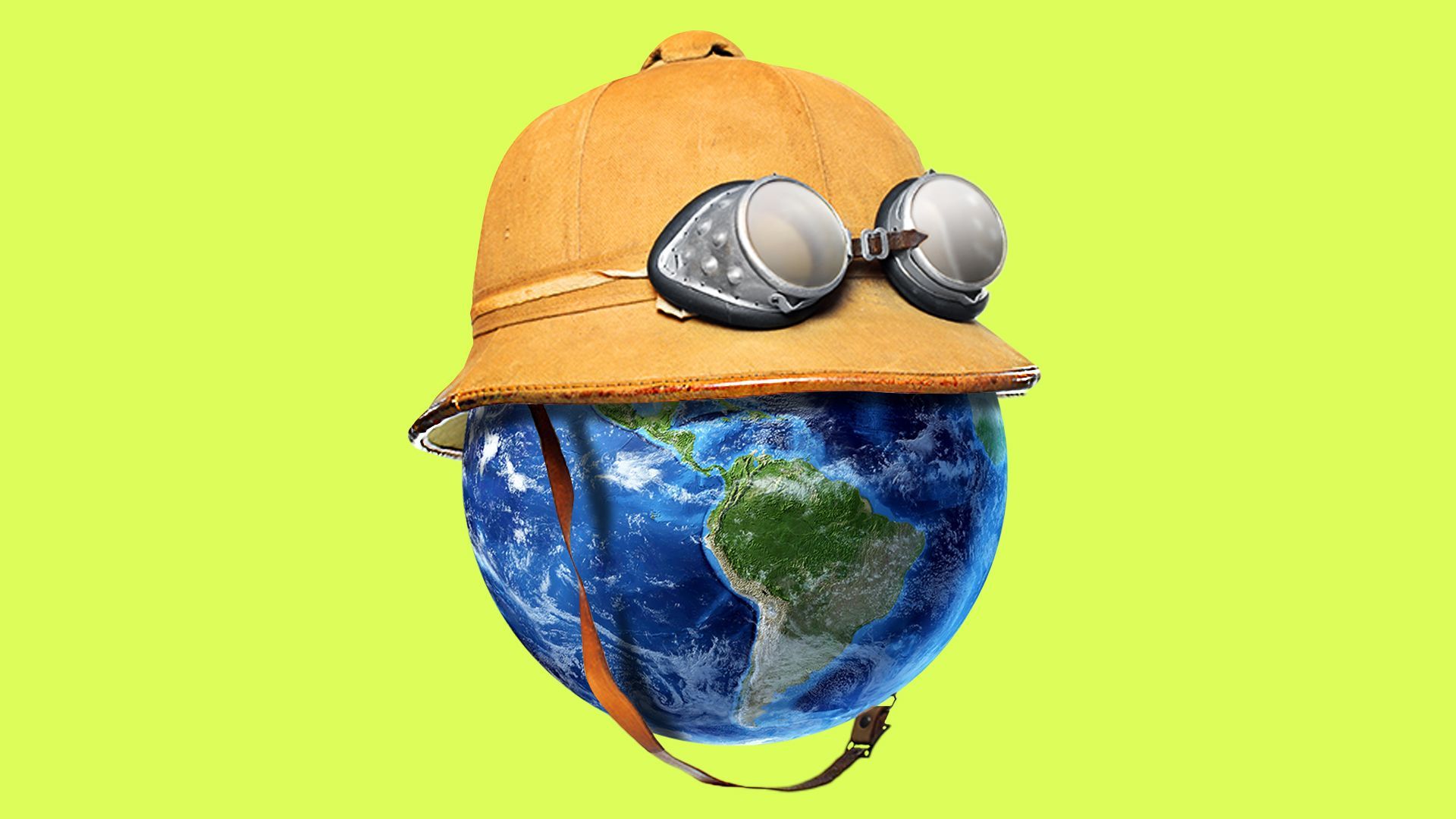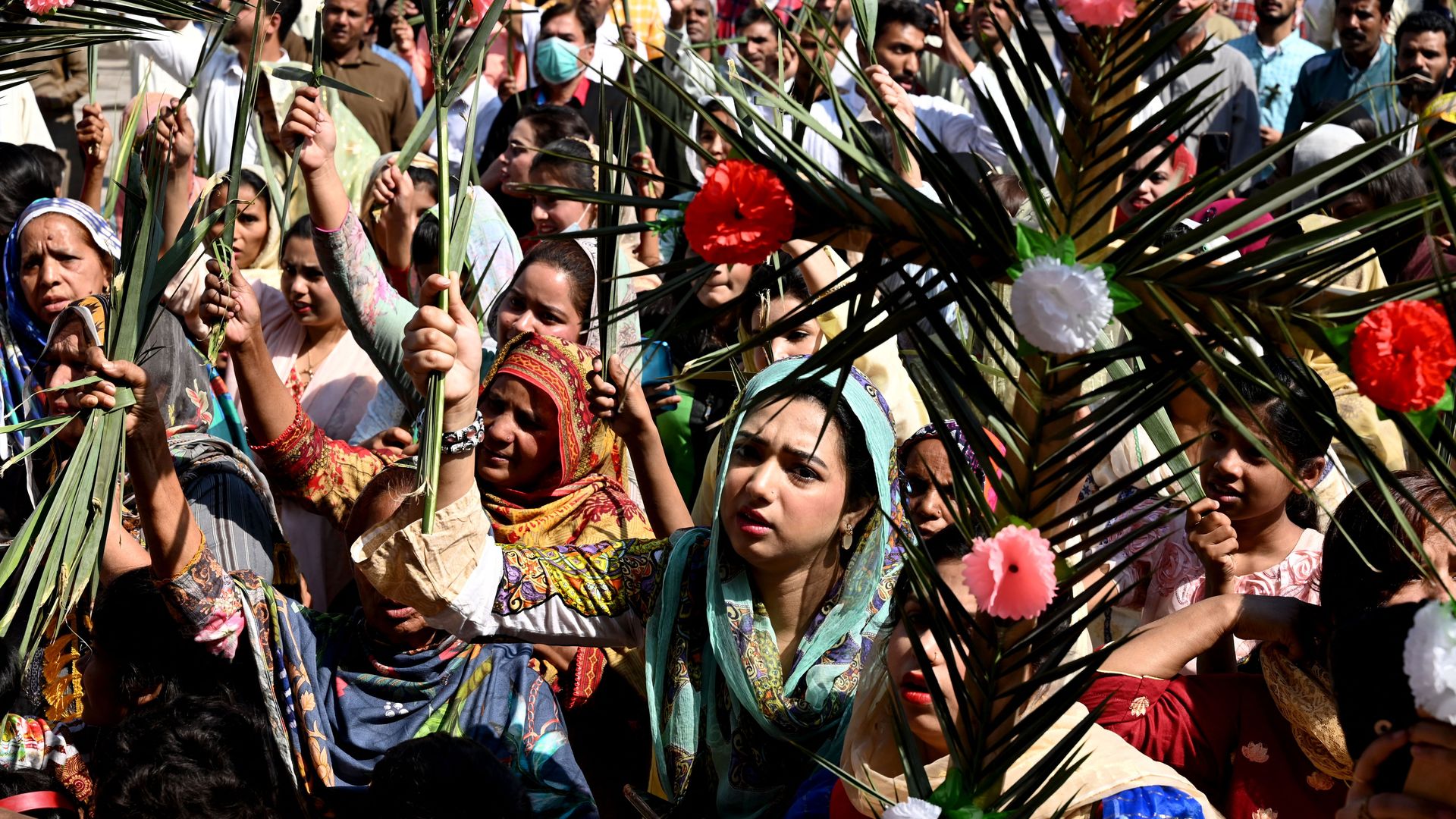| | | | | | | | | | | Axios World | | By Dave Lawler · Apr 03, 2023 | | Welcome back to Axios World. - In tonight's edition (1,626 words, 6 minutes), we cover arrests, explosions, helping and healing.
- Heads up: Join me and Axios' Sara Kehaulani Goo tomorrow at 11am ET for a virtual event on the future of democracy, featuring interviews with USAID administrator Samantha Power and Rappler CEO and Nobel laureate Maria Ressa. Register here.
New arrival? Subscribe. | | | | | | 1 big thing: What Putin's partners gain for helping Russia |  | | | Vladimir Putin meets Kim Jong-un in 2019 in Vladivostok. Photo: Alexy Nikolsky/Sputnik via Getty Images | | | | As much of the world backs away from Russia over its invasion of Ukraine, Moscow is providing cheap oil, a friend on the UN Security Council and sensitive military technology to those partners still standing by it. Why it matters: According to the White House, Russia is swiftly moving toward a "full-fledged defense partnership" with Iran, and now plans to dispatch a delegation to negotiate with North Korea. Meanwhile, the U.S. continues to fear that China will abandon its supposed "neutrality" and back Russia more directly. Driving the news: The U.S. Treasury sanctioned a Slovak arms dealer last Thursday for allegedly attempting to broker a deal whereby North Korea would send "over two dozen kinds of weapons and munitions" to Russia in exchange for "commercial aircraft, raw materials... commodities" and potentially cash. - The White House previously accused North Korea of supplying Russia's Wagner Group with missiles and rockets to use in Ukraine. Pyongyang denied arming Russia at the time, and said it had no intention of doing so.
- National Security Council spokesperson John Kirby said Thursday that Russia intends to send representatives to North Korea to seek munitions in exchange for food. North Korea is experiencing a severe food crisis.
Between the lines: Both Russia and Ukraine are facing shortages of equipment and ammunition, artillery shells in particular. - Ukraine's backers in Brussels and Washington are scrambling to provide Kyiv with desperately needed 155mm shells.
- With his own military-industrial complex struggling to keep up, the Biden administration claims, Russian President Vladimir Putin is turning to "rogue regimes."
Russia has been using Iranian attack drones in Ukraine for months, and in exchange is offering Tehran "an unprecedented level of military and technical support," Kirby warned in December. - Iran denies shipping drones since the invasion, and Russia has denied using them, though Ukraine regularly reports shooting them down.
- In March, Moscow finalized a deal to sell advanced fighter jets to Tehran's poorly equipped air force. Iranian pilots have already received training on the system, the White House says.
- A member of Iran's parliamentary national security commission told state media that Iran had also ordered helicopters, missiles and air defense systems from Russia. According to the WSJ, Russia is also providing surveillance technology for domestic use in Iran.
- CNN reports Russia has also sent some U.S. weapons captured in Ukraine to Iran for intelligence purposes. Monitoring the performance of their drones in Ukraine will also help Iran refine its technology and tactics, analysts say.
Several other countries are backing Russia's invasion at the UN, underscoring that a pariah to the West tends to be a friend to Putin. - Many were already close to Russia before the invasion. Syria's Bashar al-Assad and Belarus' Aleksandr Lukashenko both might have lost power if not for Putin, while Mali's junta relies on Wagner mercenaries.
- Nicaragua's Daniel Ortega, increasingly reviled in Washington, is moving closer to Moscow.
- So is Myanmar's military regime, which has held a series of high-level engagements with Moscow and purchased Russian weaponry, and is seeking to tap Russia's expertise in another area: nuclear power.
- As with North Korea, Iran and Syria, Russia has blocked statements condemning Myanmar at the UN Security Council.
Many more countries aren't providing their arms or even their votes, but refuse to condemn Russia or suspend trade. Those include more than a dozen countries in Africa, India and, crucially, China. - For many of them, Russia is a key source of oil, weapons, fertilizer or grain.
- For China, Putin's Russia is also a vital ideological ally in its rivalry with the U.S. While Beijing denies any intention of sending arms, and there's no evidence it's currently doing so, some analysts believe that could change if the Kremlin seems in danger of a destabilizing defeat.
|     | | | | | | 2. Scoop: U.S. discussing freeze-for-freeze on Iran's nuclear program |  | | | Illustration: Annelise Capossela/Axios | | | | The Biden administration has been discussing a proposal with its European and Israeli partners for an interim agreement with Iran that would include some sanctions relief in exchange for Tehran freezing parts of its nuclear program, Axios' Barak Ravid scoops. Why it matters: The new approach by the Biden administration shows just how concerned the U.S. is about recent advances in Iran's nuclear program. - Iran has amassed 87.5 kilograms of 60% enriched uranium, according to an International Atomic Energy Agency report from late February. Experts say that if that uranium is enriched to 90%, it would be enough to produce at least one nuclear bomb.
- A primary objective of the new U.S. approach is to halt uranium enrichment at 60% purity.
Behind the scenes: The Biden administration started discussing the new approach in January and briefed its allies about it in February, according to 10 Israeli officials, Western diplomats and U.S. experts with knowledge of the proposal. - Iranian officials have so far rejected the idea, saying they don't want a deal that includes anything less than the 2015 nuclear agreement, according to the three of those sources.
Go deeper |     | | | | | | 3. Global news roundup |  | | | The aftermath of Sunday's explosion in St. Petersburg, which killed pro-war blogger Vladlen Tatarsky. Photo: Olga Maltseva/AFP via Getty Images | | | | 1. OPEC+ last night unexpectedly announced cuts to oil production, with Saudi Arabia leading the charge. - National Security Council spokesperson John Kirby said the White House considers the cut unwise but won't "rip up" its relationship with the Saudis over it.
- Flashback: Kirby said the White House would "re-evaluate" its relationship with Riyadh after the Saudis slashed production last October. The tone has softened considerably despite today's move.
2. The lower house of Malaysia's parliament voted today to end mandatory death sentences, which are imposed for crimes such as murder or terrorism. The upper house is expected to follow suit soon. - Malaysia has had a moratorium on executions since 2018, but 1,341 prisoners remain on death row. Most received mandatory sentences.
- The reforms would entitle them to sentence reviews and punish serious crimes with prison sentences of up to 40 years.
3. Kenyan opposition leader Raila Odinga is temporarily suspending the protests he's been leading twice a week in order to take part in talks with the government on electoral reforms and economic issues. 4. Russian authorities have arrested a woman they claim handed a statuette to one of Russia's highest-profile pro-war bloggers before it exploded and killed him. Around 30 people were reportedly wounded in the blast. - Vladlen Tatarsky, the blogger, had been giving a talk in a St. Petersburg cafe once owned by Wagner Group boss Yevgeny Prigozhin.
- A Russian counterterrorism committee blamed Ukraine, which has not claimed responsibility.
More Russia-Ukraine headlines... - The priest who leads Ukraine's most famous monastery has been put under house arrest for allegedly justifying Russia's invasion, which is now a criminal offense.
- "Russia's security services are confiscating the passports of senior officials and state company executives to prevent overseas travel, as paranoia over leaks and defections spreads through President Vladimir Putin's regime," the FT's Max Seddon reports.
- This heartbreaking profile of detained WSJ reporter Evan Gershkovich is well worth your time.
|     | | | | | | A message from Axios | | Keep up on the go | | |  | | | | Catch up on the biggest stories of the day and why they matter with the Axios Today podcast. Host Niala Boodhoo is joined by journalists from Axios' newsroom to unpack the stories shaping your world and the trends shaping our time. Listen for free. | | | | | | Bonus: Where in the World |  | | | Illustration: Natalie Peeples/Axios | | | | Today's category is geopolitical breakups. - The Balkan country of "___ and ___" split up in 2006.
- Those countries had all been a part of the bigger union of ___, which broke apart in 1991.
- Around that same time, the central European state of ___ peacefully split into two countries, effectively splitting its name and its territory.
- Much of this upheaval was triggered by the dissolution of this superpower into 15 pieces in 1991.
- Earlier in 1991, this country broke away from Ethiopia after a war.
- Also in 1991 and also in the Horn of Africa, this unrecognized but self-governing state declared independence.
- A year earlier, this dry and sparsely populated country gained independence from South Africa following a protracted conflict.
- This Middle Eastern union came together in 1958 but dissolved three years later when Syria pulled out (Egypt kept the name for a while).
- This kingdom was occupied in 1910 and then split up after WWII into two countries that today have very different visions for reunification.
Scroll to the bottom for answers. |     | | | | | | 4. Historic 48 hours for Finland |  | | | Sanna Marin holds a closing campaign rally on Friday. Photo: Jonathan Nackstrand/AFP via Getty Images | | | | Finland Prime Minister Sanna Marin's Social Democrats yesterday lost an incredibly close election, likely bringing her tenure to an end after three and a half years. - She took office at 34 and came to prominence as part of a new generation of progressive leaders. She's been a strong supporter of Ukraine and of Finland's NATO candidacy.
- By the numbers: While her party actually gained seats in the election, it finished third with 19.9% of the vote, behind the center-right National Coalition Party (20.8%) and the populist Finns Party (20.1%).
- What's next: The NCP, which campaigned on cutting government spending, will get the first crack at forming a coalition. The party says it will stay the course on Ukraine and NATO.
Tomorrow, Finland will formally join NATO, more than doubling the length of the alliance's borders with Russia.  Data: NATO; Map: Axios Visuals |     | | | | | | 5. Data du jour: Countries that have charged ex-leaders | | Donald Trump is expected to be formally charged and arraigned tomorrow in New York on charges of falsifying business records. - Trump declared after being indicted that "THE USA IS NOW A THIRD WORLD NATION," a statement echoed by his sons and many of his supporters.
 Data: Axios Research. Note: "Complicated" includes cases that are unclear, or where a former leader was temporarily detained (often following a coup) but never formally charged. Impeachments were not included. Map: Axios Visuals The big picture: Leaders who left office since 2000 have been jailed or prosecuted in at least 78 countries — including in wealthy democracies like France, Israel and South Korea, according to an Axios tally. Go deeper |     | | | | | | 6. Pope leaves hospital and leads services |  | | | Photo: Vatican Media via pool/Getty Images | | | | Pope Francis led Palm Sunday Mass in St. Peter's Square on Sunday, a day after being discharged from the hospital where he had been treated for bronchitis. - "I'm still alive," he quipped upon being discharged.
|     | | | | | | 7. Stories we're watching |  | | | Pakistani Christians celebrate Palm Sunday in Lahore. Photo: Arif Ali/AFP via Getty Images | | | - NASA names crew for moon mission
- Lawmakers to meet top CEOs on China
- China's VC investing had a rough 2022
- U.S. manufacturing comes off its high boil
- Wagner raises Russian flag in Bakhmut but Ukraine fights on (BBC)
- U.S. uses spyware it's trying to kill (NYT)
- Why neoliberal measuring sticks don't work anymore
Quoted: "Keep on fighting, Mr. President! We are with you." — Hungarian PM Viktor Orbán's message to Donald Trump |     | | | | | | A message from Axios | | Keep up on the go | | |  | | | | Catch up on the biggest stories of the day and why they matter with the Axios Today podcast. Host Niala Boodhoo is joined by journalists from Axios' newsroom to unpack the stories shaping your world and the trends shaping our time. Listen for free. | | | | Answers: 1. Serbia and Montenegro; 2. Yugoslavia; 3. Czechoslovakia; 4. USSR; 5. Eritrea; 6. Somaliland; 7. Namibia; 8. United Arab Republic; 9. Korea Key: - The Balkan country of "___ and ___" split up in 2006 into those two countries + Kosovo.
- Those countries had all been a part of the bigger union of ___, which broke apart in 1991.
- Around that same time, the central European state of ___ peacefully split into two countries, effectively dividing up its name and its territory.
- Much of this upheaval was triggered by the dissolution of this superpower into 15 pieces in 1991.
- Earlier in 1991, this country broke away from Ethiopia after a war.
- Also in 1991 and also in the Horn of Africa, this unrecognized but self-governing state declared independence.
- A year earlier, this country had gained independence from South Africa following a protracted conflict.
- This Middle Eastern union came together in 1958 but split up three years later when Syria pulled out (Egypt kept the name for a while).
- This kingdom was occupied in 1910 and then split up after WWII into two countries that both still talk about reuniting... in very different ways.
|  | | Are you a fan of this email format? Your essential communications — to staff, clients and other stakeholders — can have the same style. Axios HQ, a powerful platform, will help you do it. | | | | | | Axios thanks our partners for supporting our newsletters.
Sponsorship has no influence on editorial content. Axios, 3100 Clarendon Blvd, Arlington VA 22201 | | | You received this email because you signed up for newsletters from Axios.
To stop receiving this newsletter, unsubscribe or manage your email preferences. | | | Was this email forwarded to you?
Sign up now to get Axios in your inbox. | | | | Follow Axios on social media:    | | | | | |













No comments:
Post a Comment